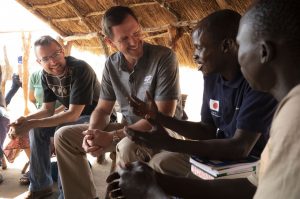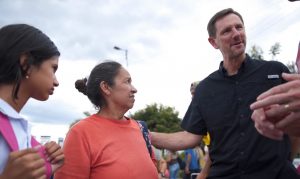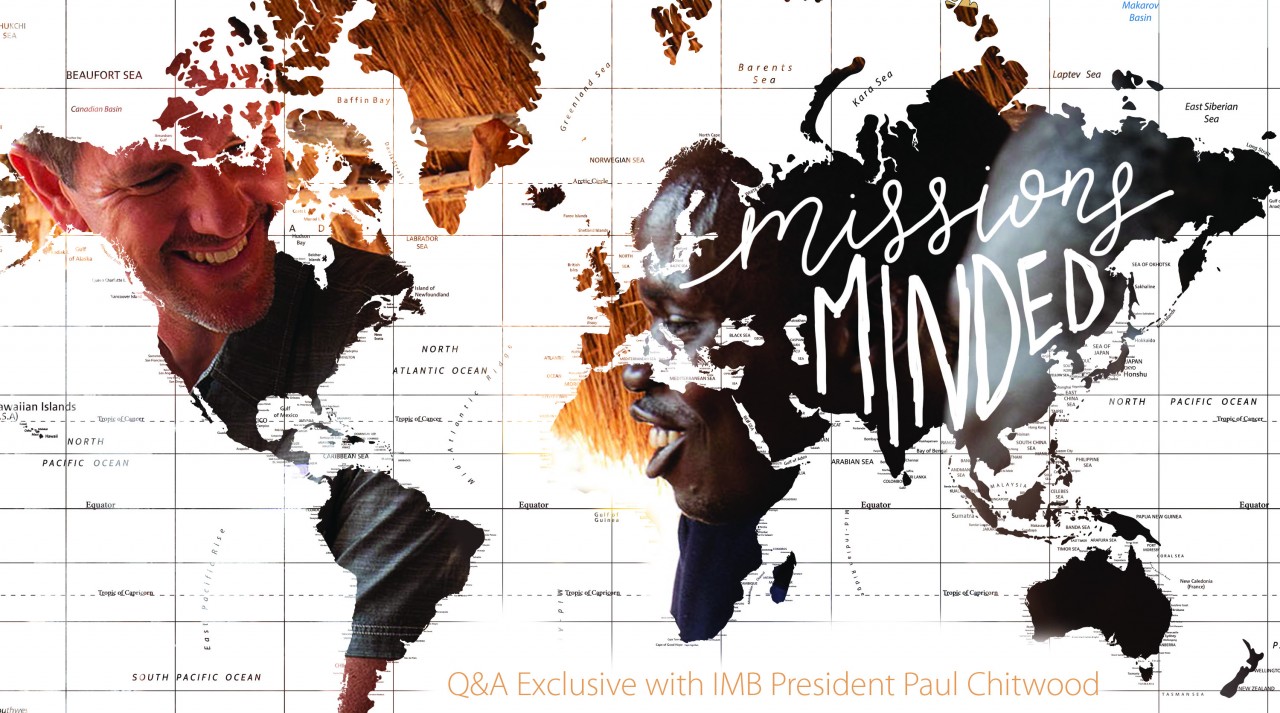EDITOR’S NOTE: The following is from the transcript of a recent edition of Messenger Insight featuring Paul Chitwood who serves as International Mission Board (IMB) president.
 Q: We’re coming on the heels of an amazing Southern Baptist Convention when a missionary sending event for the IMB took place. In November, there will be an IMB missionary sending event coming right here to Oklahoma. Talk about why it was important that you partner with Oklahoma to host this special sending.
Q: We’re coming on the heels of an amazing Southern Baptist Convention when a missionary sending event for the IMB took place. In November, there will be an IMB missionary sending event coming right here to Oklahoma. Talk about why it was important that you partner with Oklahoma to host this special sending.
A: Well, several reasons. One is we love Oklahoma Baptists, and Oklahoma Baptists love the lost; they love the IMB, and they especially love their missionaries. In fact, Oklahoma Baptists are the most generous group of Baptists, when you group them by state conventions that exist in the world today. Oklahoma Baptists give a larger percentage of the designated offerings and receipts coming into their churches. They give the largest percentage through the Cooperative Program than any other state convention or any other group of Baptists, so we’re excited to be able to, as we’re beginning again (it’s been several years) since we had sending celebrations and appointments of services out in local churches or with state convention partners. As we relaunch that effort, we’re excited that (the Baptist General Convention of Oklahoma) is the first place that we’re going.

Paul Chitwood, center, sits with missionary Kevin Singerman and Geofrey Ochan of Hope Baptist Church in Uganda. Photo by Chris Carter
Q: That event will be Nov. 12, at Oklahoma City, Quail Springs. More information will be coming from the IMB and the BGCO on that. You’ve stepped right into your role, and we’ve been reading about your travels and spending time with some of the IMB missionaries. Reflect on some of those encounters.
A: We’ve had the opportunity to travel to several places in the world and be alongside our missionaries as they’re doing their work, be it in refugee settlements with them, be on borders with them, be in urban centers, church plants and preaching and teaching points or seminaries. The work is very diverse, as you know, so we’ve had the opportunity to be connected to many different aspects of it. We’ve also had some large gatherings of missionaries overseas where they’ve come together for training and equipping and fellowship and get to meet a lot of folks at once, which has been good.
Q: What are some of those challenges and opportunities you see, especially today for those serving with the IMB?
A: Thinking about our missionaries overseas, at no time in human history has the planet been populated to the extent that it is populated today. We live in the generation of the largest number of people; that means the largest number of lost people that are on the planet. (This is) the greatest opportunity for the Gospel to go out in human history. That the Lord would think enough of us, enough of Southern Baptists and other believers in this day to allow us to live in this age is humbling, and I’m praying that the Lord will help us take advantage of the opportunity to reach so many lost people.
I’m also thankful for the way Southern Baptists work together to get that done. The opportunity of using modern technology, of using the mass resources the Lord has entrusted to Southern Baptist churches and evangelical believers that are a part of Southern Baptist churches, to the Convention as a whole and to the IMB. Never before have we had the kind of resources that we have at our disposal, so there’s a great opportunity for Gospel advance, and we’re seeing the Gospel advance in tremendous ways.

IMB President Paul Chitwood visits with refugees along the Venezuelan border.
The challenges—obviously, there’s an enemy afoot, and he is wanting to hold his ground. To engage lostness is to engage spiritual warfare. We know that, ultimately, the battle is against principalities and powers as Scriptures teach us, but that’s expressed through security issues, through closed countries and governments that are not welcoming to missionary presence. A lot of creativity is required; some risk is involved, and so in order to give good support to our missionaries and help them be wise in how they carry out their work, we are striving to meet those challenges so our missionaries can be effective.
Q: In reading the Baptist Press story as you were elected IMB President, you talked about God wanting you to be a mobilizer for missions and the mission. What are some of your hopes for that part of the work?
A: I think “calling out the called,” a new wave of sending, is an important part of that. We currently have more fully-funded missionary positions (full-time, overseas positions) than we have candidates in the pipeline to fill. That creates a great opportunity for us to see those jobs filled and we’re shouting from the rooftops saying, “If God is working in your life, if you’re called, equipped, ready to go, then please come and consider going through the IMB.”
That’s a part of the mobilizing that we want to see happen. We ultimately, know that engaging Southern Baptist churches in the work in a hands-on way is key to getting the Gospel to all the nations, to all of the lost nations of the world. Mobilizing includes working with those churches that are already heavily engaged in overseas missions opportunities, working with state conventions and local associations that are very engaged. If there is an association anywhere or a church that is not engaged then we encourage them to be engaged. We want them involved.
There is also the funding side of that. We’ve seen a significant reduction in the number of missionaries serving through the IMB over the last 10 to 12 years. We probably reached the height of our number around 5,600-5,700 missionaries that were serving through the IMB in 2005-2006. We’re right at 3,700, and that reduction took place over the years because of a lack of funding to keep the number of missionaries out on the field.
We have had the opportunity to add a few positions back, and we are now encouraging people to apply through the IMB. We really hope to see more and more resources coming in where we could significantly rebuild the force and increase the number of missionaries overseas. As I ask our missionaries, “What is the greatest need that you have in your part of the world?” Typically, the answer is, “Help. We need help.” We need more churches engaged, and we need more full-time, cross-cultural missionaries coming and planting their lives here on our team, serving alongside us because the harvest is more plentiful than the workers.





